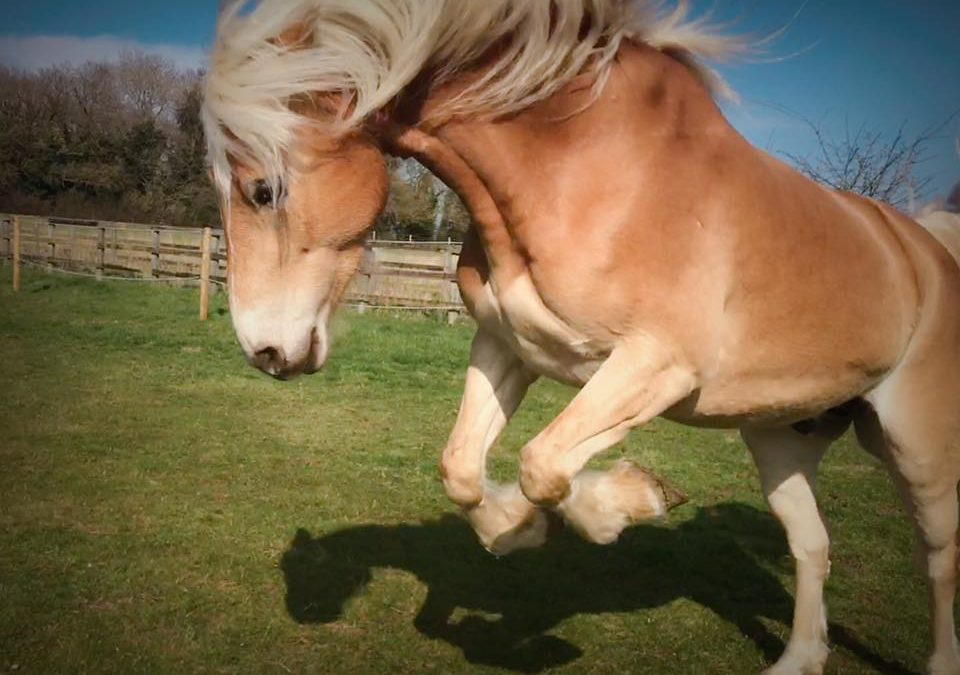 A common cause: quite often a horse will display unwanted behaviour for a simple reason; pain, discomfort, insecurity or fear.
A common cause: quite often a horse will display unwanted behaviour for a simple reason; pain, discomfort, insecurity or fear.
Over the last few weeks, I have witnessed so many people lose their groove…they get their knickers in a twist and take on a defeatist attitude. Whether it is because of a seemingly backwards step with their training, not getting to grips with an exercise fast enough or even just a lapse in confidence, these feelings are always short lived – and I should know!
These moods can be so detrimental to horse and handler/rider. When someone feels depressed, especially in terms of progression, it is easy for frustration to creep in and for patience to take a back seat. It is even more difficult when the cause of these ill feelings are due to something you care about so deeply.
If you are or have been feeling this way – read on! This is for you!
When anxiety or fear is a root cause of these feelings, it can seem like there is no way out. It becomes a battle of “should I carry on?”, “am I capable?” or “is this just a one off?”. As human beings, we need to find logic in everything; we want reason and purpose. This logical mentality, however, doesn’t always marry up with negative feelings when any amount of emotion is involved.
An example:
A horse acts out. In this instance, it is because it lacks “leadership” – security. In a herd, the Alpha (top dog!) and the Omega (the weakest link!) are the most important positions within the equine hierarchy.
The Alpha will always take leadership, ensuring the safety and success of the herd and to determine who and when the group has access to resources. When leadership is not apparent, horses will work this out among themselves; by mutually grooming, they build bonds and to assert authority and show dominance they will physically move other horses, by using body language and often by kicking or biting.
So when a horse displays dominant behaviour around a person – it can be incredibly dangerous, but more so, very frightening for us.
One of the most common issues I deal with is “barging”.
If you watch, a horse will actually play in the field with others. Quite often you can spectate a battle of wills! They will see who can move the others’ feet first. The loser is the one which moves! This “game” is often see among youngsters.
When a horse feels the need to challenge its handler, to take control of the situation if its handler isn’t equipped to, it will start by either nipping, or barging; tactics to move the person. These situations can soon escalate. When a horse starts behaving in this way and the handler either moves away (moving their feet and confirming the horse’s authority!) or does not oppose or correct the behaviour, the positions within the herd start to become assigned.
A piece of cake… A huge barging horse confronts you…so you just ask them to stop, right? It isn’t easy! This can be a scary situation, even for experienced horse handlers.
What to do ——>
It is crucial to ensure that when training a horse, you build upon solid foundations – the most important aspects in the beginning, being trust, respect and fairness.
A horse must trust that you will take control when a situation arises, so they can feel happy and secure from day to day. They must respect you to ensure your safety, to be able to enjoy each others’ company and to be able to progress in anything you do together. Finally, they must be treated with fairness at all times. A horse is a living, sentient being, who demands respect and should never be taken for granted. A horse forgives, but never forgets.

So ask yourself:
1. Where do you see yourself within your own “herd” currently?
2. Where would you like to be in terms of hierarchy?
If you have realised that you are in fact being lead by your horse, there are some simple and non confrontational ways to ensure your safety, to build a bond, to gain respect and also to have fun!
A horse doesn’t necessarily display undesired dominant behaviours to be nasty, but to establish and maintain their social position within the “herd” that we, as horse owners, have put them into.
If you feel you are in a pickle, would like some extra support with your training, or would like to start learning with Sense Equine, please do fill in the form below and Alex will be in touch as soon as possible.
(In person and distance learning is available)



